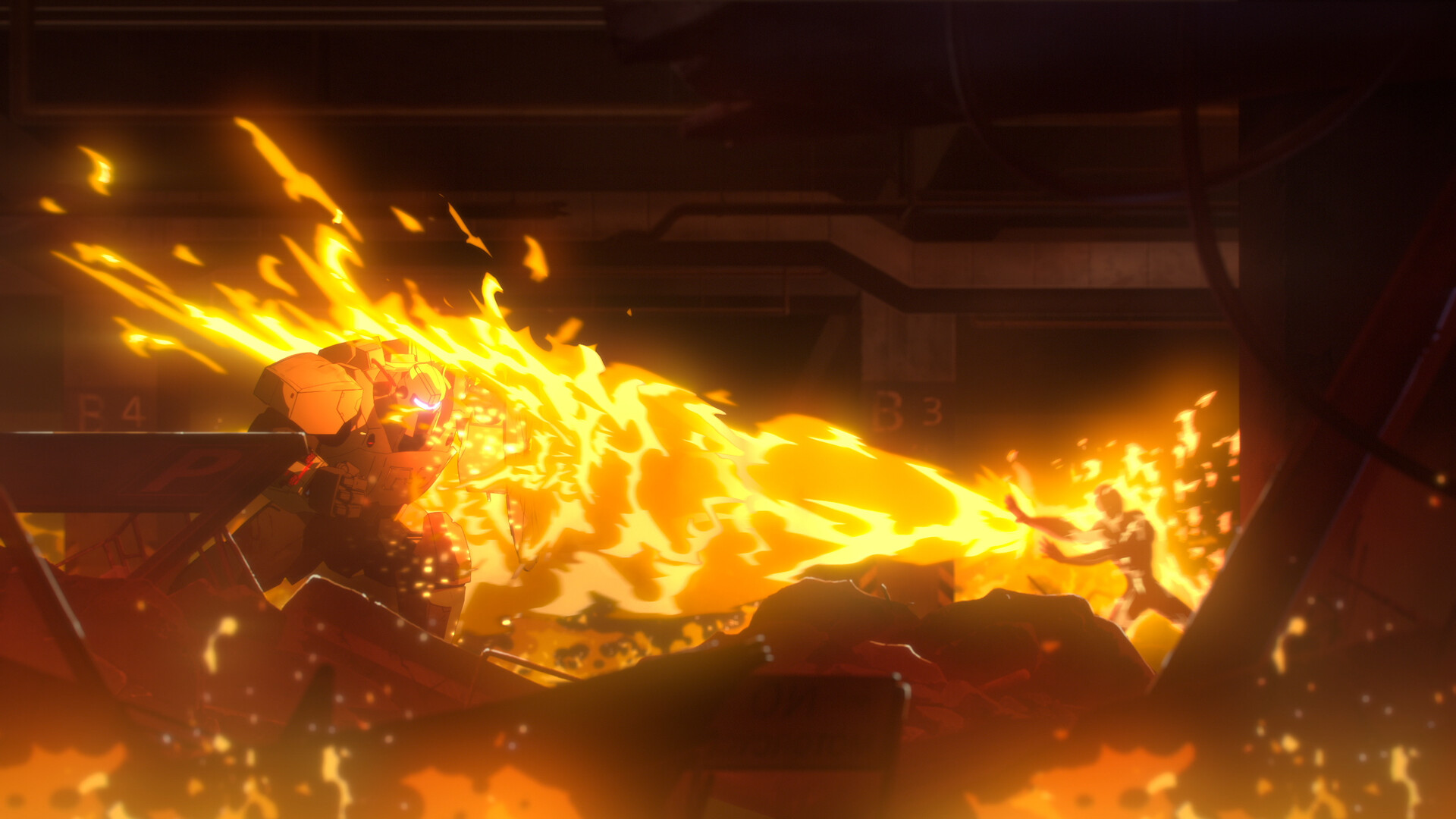Superhero stories evoke a range of emotions, from the gritty detective noir of Batman to the hopeful aura of Superman, the fantastical, larger-than-life conflicts helping us forget the mundane everyday. And yet, the genre displays a remarkable capacity for grounded characterization and everyman plotlines with a raw feel. As great as it is to see all-powerful beings capable of engaging in fist-fights or world-ending battles, there’s something so enticing about their personal dilemmas.
The urge to fight against one’s supervillain instincts even after numerous failures; the journey to be better, even when the whole world tells you that you’re a screw-up; the drive to be a hero, even when you don’t fit the bill; and moving on, even if the pain is all you’ve ever known. Dispatch, AdHoc Studio’s first proper narrative adventure game since announcing The Wolf Among Us 2 with Telltale Games way back when, tackles all of these subjects and more with a humanistic lens.
The structure will be very familiar with its extensive cutscenes, emphasis on dialogue choices, and ominous upper-left notifications that so-and-so character will remember that. However, Dispatch goes far beyond the usual Telltale format to deliver a story with sharp writing, phenomenal characterization that makes every character endearing, and yes, even some fun gameplay elements that elevate it beyond the average text-based adventure with bells and whistles.
“All of these characters and so many more are just so delightfully written. Comedy in any superhero story is tough, especially in this post-MCU age, but Dispatch pulls it off without a hitch, with the tight dialogue and pacing supplanted by the excellent performances.”
Of its many relatable moments, the story begins with Robert Robertson, aka Mecha Man, or at least the latest to inherit the suit. After a battle against the mysterious Shroud and his super-powered cronies, the suit is pretty much destroyed. A chance encounter with the Blonde Blazer leads to an offer to work for the Superhero Dispatch Network. His task is to manage a group of superheroes, allocating them to different tasks and overseeing their progress.
However, Robert’s job involves dealing with a group of so-called “reformed” supervillains with bad attitudes. What should be the set-up for a sitcom-like situation is…well, exactly that, and Dispatch doesn’t shy away from feeling like The Office meets the Thunderbolts. The Z-Team, such as they are, are as comical as they are dangerously powerful, but the engaging writing means you’ll want to learn more about them, even at their ugliest.
Invisigal can turn invisible but only when holding her breath, and asthma means an inhaler is as essential as her fists. Sonar is a Harvard graduate – smart but also arrogant when he’s not being an idiot (it’ll make sense, don’t worry). He’s also capable of transforming into Mega Bat, which does little to change his demeanor but at least offers more tools to tackle different situations. Flambae is a hothead in terms of powers and demeanor, though his Razor Ramon-like charisma makes up for his lack of intelligence.
All of these characters and so many more are just so delightfully written. Comedy in any superhero story is tough, especially in this post-MCU age, but Dispatch pulls it off without a hitch, with the tight dialogue and pacing supplanted by the excellent performances.
Phenomaman, played by Travis Willingham, may come across as your average arrogant take on Superman, but instead comes across as more clueless and innocent to the world around him. Coupé, played by Mayanna Berrin (who’s also one of the writers, amazingly enough), is as shrouded in mystery as any assassin-turned-superhero, yet her snark and deadpan delivery elevate her beyond the same. Alanah Pearch as Malevola is dark and imposing with her supernatural powers, but also strangely approachable and relatable in her own way.
“Disruptions present skill checks of a sort, challenging you to resolve emergencies by leaning on a certain hero’s strengths. Then again, if you’re smart and send the right hero for a job, they can instantly resolve it without any risks.”
It’s so difficult to choose a favorite character because of how great they can be, whether it’s basking in victories or mocking each other with parodies of artist names (which could have been disastrous anywhere else). However, Robert Robertson, played by Breaking Bad’s Aaron Paul, is the glue that connects it all. Bouncing between naivete, self-deprecation, cynicism, wishful thinking, and blind hope sounds impossible, and yet, he delivers an incredibly layered performance.
While the humor is a big appeal of Dispatch, it’s only one part of the overarching narrative. Trying to be a hero even without powers and his family’s keepsake, Robert is an empathetic figure as a whole, but that doesn’t mean he isn’t prone to bouts of anger and annoyance. Much of that rides on the player’s own dialogue choices, yet it never feels like you’re pursuing one personality over the others. Instead, they’re all shades of the once (and hopefully once-again) Mecha Man, resulting in exchanges that feel natural without ever breaking character. Multiple other threads run through the story, but I don’t want to spoil them – they’re just that much worth experiencing first-hand.
However, oftentimes in a Telltale-style experience, the writing and presentation have to do more than their share of heavy-lifting to carry the gameplay, which ends up serviceable but an accessory overall. Dispatch weaves its set-up into the actual gameplay mechanics, presenting a pseudo-management-style game. Throughout your shift, new cases and emergencies crop up, and you need to send a hero – or heroes if multiple slots are available – to deal with them. Each Z-Squad member is skilled in different stats. Prism is charismatic and more than capable of dishing out a beating, but Golem can also deal damage while tanking more than his fair share.
Not everyone is capable of handling the same emergencies, so oftentimes, it may be a good idea to send other heroes to shore up any weaknesses. When they complete a task, they’ll return to SDN HQ and rest, making them temporarily unavailable during this short period (unless you use consumables like a fresh pot of coffee to get them off the bench). Other emergencies will pop up, though, and it becomes a task of juggling resources.
You would think this might quickly become stale, but Dispatch shakes things up in constantly surprising ways. Disruptions present skill checks of a sort, challenging you to resolve emergencies by leaning on a certain hero’s strengths. Then again, if you’re smart and send the right hero for a job, they can instantly resolve it without any risks. Certain scenarios also provide avenues for a hacking mini-game where Robert navigates paths, using directional inputs to unlock gates, obtain passwords and avoid viruses to commandeer cameras or track down scammers.
“Even after the positive reception to its first two episodes, I never thought AdHoc Studio would build on that momentum and deliver one of my favorite stories – video game and otherwise – of this year.”
But that’s not all. Completing tasks earns XP for heroes, allowing you to improve one of their stats to min-max their respective proficiencies or make them more suited for other tasks. So while I kept Sonar as a more intelligent, charismatic individual and Invisigal as the hard-hitting, mobile hero, Malevola would slowly but surely evolve into a hero that could potentially shore up weaknesses in any team-ups.
Each hero also has different traits, like Invisigal working better alone or Prism creating a copy of another hero, adding half their respective stats to the task at hand. Did I mention that superhero training can also crop up, letting you select different specializations for each hero? Flambae’s talent for burning hot and instantly crashing out is manifested in Supernova, where succeeding two jobs in a row will max out his combat and mobility stats and eliminate rest time. However, one failure and all his stats drop to 1. Heroes can also get injured or go out of commission, and it’s up to you to adapt. If certain team-ups succeed enough times, they’ll unlock powerful synergies, making them even more of a force to reckon with.
Even with all this happening, it never bogs down the narrative, instead complementing and accentuating it in different ways. Heroes chat with each other – and Robert – during shifts, sometimes even going off on their own for different reasons. A seamless interface and controls ensure the pacing remains slick all throughout, while the different options and approaches lend some surprising amounts of replay value.
In terms of presentation, Dispatch’s visuals and music are top-tier, the former making each episode feel more like a high-quality animated TV show than a game on most occasions. However, I was also very impressed by the cinematography, editing and overall cutscene choreography. Even without the choices and gameplay, this would be a highly compelling show to watch in its own right. With them, it’s a superhero story that’s simply impossible to resist.
Even after the positive reception to its first two episodes, I never thought AdHoc Studio would build on that momentum and deliver one of my favorite stories – video game and otherwise – of this year. Dispatch is just so packed with such passion, be it in the writing, performances and presentation, that it’s almost impossible to put down. Where Robert, Z-Squad and the SDN go from here remains to be seen, but this is a narrative adventure that you simply owe it to yourself to experience.
This game was reviewed on PC.





This post offers an intriguing look at superhero stories and their emotional depth. It’s fascinating how diverse these narratives can be, from the darker tones of Batman to more uplifting themes. Thanks for sharing these insights!
I completely agree! The emotional complexity in superhero narratives often reflects real-life struggles, making them relatable. It’s interesting how different characters embody various aspects of hope and resilience, resonating with audiences in unique ways.
Absolutely! It’s fascinating how these stories can serve as a mirror to our own challenges, showing that even heroes grapple with their flaws. It really adds depth to the genre and makes the characters more relatable.
Absolutely! It’s interesting to see how superhero narratives often highlight not only personal struggles but also societal issues. This duality allows us to connect on multiple levels, making the stories feel even more relevant today.
You’re right; the personal struggles of superheroes really add depth to their stories. Additionally, the way these narratives address themes like morality and sacrifice can leave a lasting impact on the audience, often prompting us to reflect on our own choices.